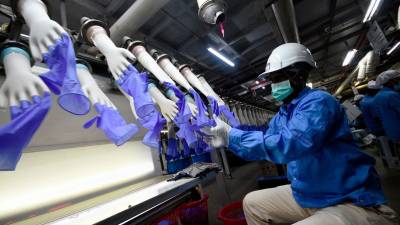KUALA LUMPUR: Malaysia’s position as the world’s leading rubber glove exporter depends on continued emphasis on high-value manufacturing during the 13th Malaysia Plan period.
The Malaysian Rubber Glove Manufacturers Association emphasised that digitalisation, sustainability and labour market reforms are equally crucial for maintaining this competitive edge.
Margma president Oon Kim Hung stated that “this would enable the sector to continue to contribute significantly to the nation’s economy and export growth.”
He highlighted the importance of government-to-government trade agreements to secure preferential access to major markets amid rising competition and tariffs.
Malaysia exported RM15.41 billion worth of rubber gloves last year, representing 45.8% of total rubber product exports valued at RM33.7 billion.
The United States, Germany, Japan, the United Kingdom, China and Indonesia remained the primary markets for Malaysian rubber gloves.
Oon welcomed the 13MP’s balanced approach between economic growth and nation-building, noting that “we welcome the focus on high-value manufacturing, digitalisation, sustainability, and labour market reforms.”
He emphasised that continuous investment remains essential for the industry’s sustainable future despite current challenges.
The association praised the government’s commitment to strengthening local sustainability certification standards through the Malaysian sustainable natural rubber initiative.
This framework focuses on principles of no deforestation, legal land cultivation and full supply chain traceability.
Malaysia achieved its first export of MSNR-compliant rubber to the European Union in December 2024, demonstrating the initiative’s early success.
Margma advocates for robust certification standards covering life cycle assessments, labour conditions and social compliance to enhance market differentiation.
The government’s rubber replanting programme will improve yields, quality and sustainability of Malaysia’s natural rubber supply through high-yield clones.
Oon noted that “this could restore Malaysia’s competitive edge, putting us on par with leading rubber-exporting nations like Thailand.”
He recommended pairing the programme with investments in automation, digitalisation and AI-driven plantation management to maximise impact.
The association urged establishing government-to-government trade agreements to reduce tariff barriers and ensure competitiveness in key markets.
Margma also called for boosted research and development to help industry players move into higher-value niche products and eco-friendly alternatives.
Prime Minister Datuk Seri Anwar Ibrahim recently stated the government would focus on increasing agri-commodity productivity through modern technologies and research.
The 13MP will expand replanting programmes for oil palm and rubber smallholders to boost productivity and increase export value. – Bernama
